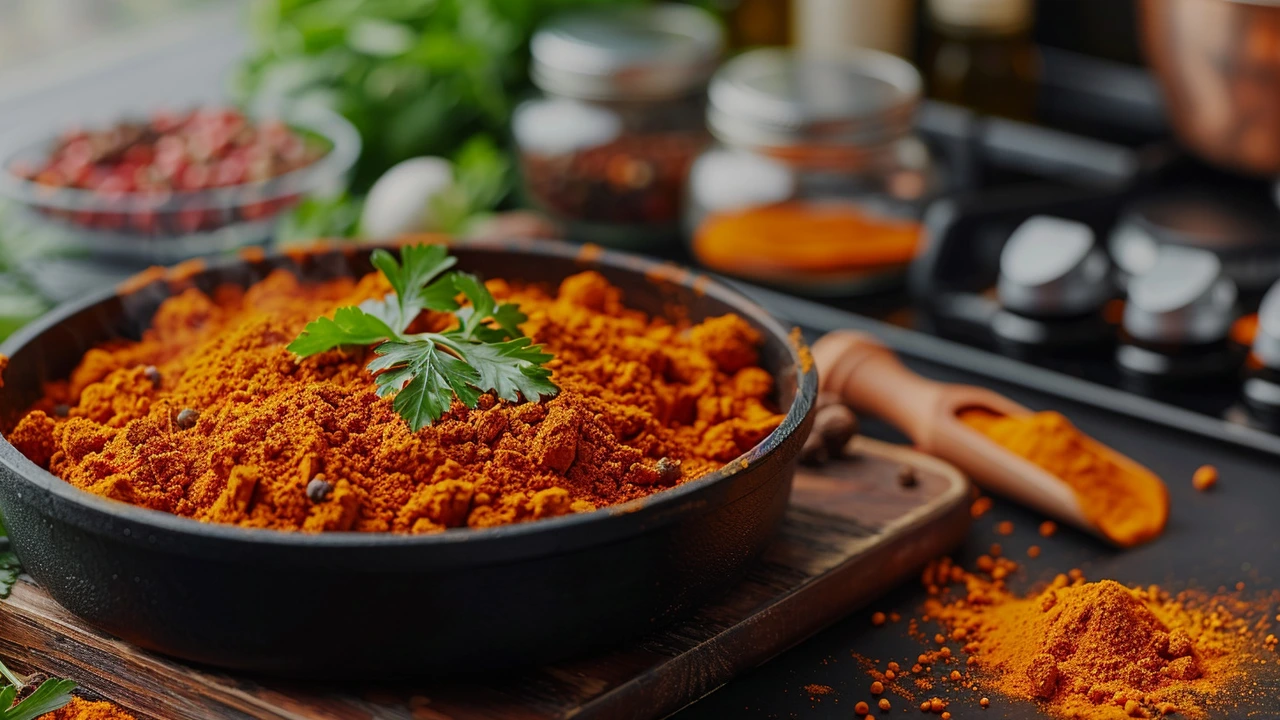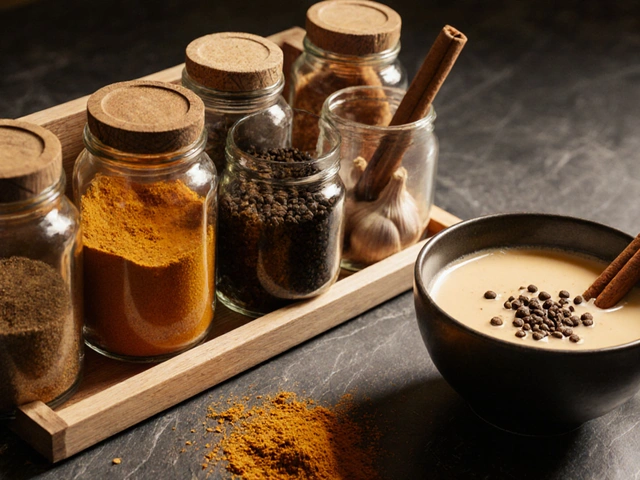Welcome to a vivid exploration of turmeric, a spice that not only enriches the flavor palette but also offers an array of significant health benefits. As we dig deeper, you'll learn about the exciting ways in which this golden spice can enhance overall well-being, backed by science and centuries of use in traditional medicine.
Imagine a natural ingredient so powerful that it not only adds zest to your meals but also supports your body in maintaining its health. That’s turmeric for you. Let's embark on this golden journey to unlock the secrets of one of nature’s most potent spices.
- What is Turmeric?
- Curcumin: The Active Compound
- Anti-inflammatory and Antioxidant Effects
- Cognitive and Mental Health Benefits
- Turmeric in Chronic Disease Prevention
- Adding Turmeric to Your Diet
What is Turmeric?
Turmeric, often referred to as the 'golden spice' or 'Indian saffron' because of its bright yellow color, is a rhizomatous herbaceous perennial plant of the ginger family. Native to the Indian subcontinent and Southeast Asia, this plant requires temperatures between 20 and 30°C and a considerable amount of annual rainfall to thrive. Historically, turmeric has been used not only as a primary spice in cuisines but also as a coloring agent, and even as a component in religious ceremonies. Its use in traditional medicine is vast and diverse, believed to heal everything from pain to jaundice to menstrual difficulties.
The main characteristics of turmeric come from its rhizomes, which are boiled, dried, and then ground into a deep orange-yellow powder. This powder carries not just a unique taste, used predominantly in curry powders, but is also packed with bioactive components, the most prominent being curcumin. Curcumin is a substance with powerful anti-inflammatory and antioxidant properties. Modern scientific research has begun to back up what Indians have known for millennia; turmeric does indeed contain compounds with medicinal properties, lending credence to its traditional uses.
In addition to its use in cooking and medicine, turmeric is a staple in many cultural ceremonies across India. For instance, during the 'Haldi' ceremony in Indian weddings, a paste made from turic is applied to both the bride and groom as part of pre-wedding rituals, symbolizing purification and peace. Despite its widespread cultivation mostly in India and parts of Asia, turmeric is now widely available globally and is used in a plethora of dietary supplements and skincare products.
Curcumin: The Active Compound
At the heart of turmeric's health benefits lies curcumin, a compound that gives turmeric its distinctive bright yellow color and a myriad of health benefits. Studies have extensively shown that curcumin is not just another nutritional component; it’s a bioactive substance that has powerful biological effects on your body’s biochemistry. Scientists have mapped out that curcumin is remarkably effective at fighting inflammation at the molecular level by targeting multiple steps in the inflammatory pathway, at the cellular level.
What truly makes curcumin intriguing is its ability to maintain and support antioxidant levels in the human body. Oxidative damage from free radicals is one of the mechanisms behind aging and many diseases. Curcumin is not only a natural antioxidant itself, but it also boosts the body's own antioxidant enzymes, essentially empowering the body to protect itself more effectively. This dual action, both direct and indirect, helps curcumin wield a powerful influence over free radicals.
Though curcumin's benefits are impressive, it’s worth noting its bioavailability can be somewhat low, meaning that not all of what is consumed can be utilized immediately by the body. However, combining turmeric with black pepper contains piperine, a natural substance that enhances the absorption of curcumin by up to 2000%. This discovery has led to increased practical use of turmeric in daily diets and supplements formulated to enhance its benefits.
Health professionals often emphasize the need for practical application of these findings. Typically, suggestions include incorporating turmeric in one's diet in natural forms or ensuring that supplementation happens under guidance to maximize the bioavailability and effectiveness of curcumin. From teas and smoothies to complex curries and stews, turmeric can be a versatile component in many dishes.
The antidepressant and anti-anxiety effects of curcumin are also gaining attention, with researchers finding evidence that it can boost brain-derived neurotrophic factor levels (BDNF), similar to what many common antidepressant medications do. This observation opens new avenues for using curcumin as a supportive treatment for mood disorders.
Anti-inflammatory and Antioxidant Effects
Turmeric is not just another condiment to add a dash of color to your dishes; it's a powerhouse of health benefits, particularly known for its anti-inflammatory and antioxidant properties. The main compound responsible for these effects is curcumin, which has been studied extensively for its potential to reduce inflammation in the body. Inflammation is a natural response by the body's immune system to fight off infections and heal injuries. However, when inflammation becomes chronic, it can lead to various health issues, including heart disease, arthritis, and even some forms of cancer.
Curcumin's ability to inhibit enzymes that promote inflammation is a cornerstone of its health benefits. Several studies suggest that it performs comparably to anti-inflammatory drugs, without the side effects. This makes turmeric a valuable supplement for those managing chronic inflammatory conditions. Adding turmeric into your diet could help mitigate the inflammation associated with these conditions, thereby enhancing your quality of life and well-being.
Moreover, as an antioxidant, curcumin also protects your cells from damage caused by unstable molecules known as free radicals. This damage, known as oxidative stress, is associated with various chronic diseases, including Alzheimer's and cancer. By neutralizing free radicals, curcumin helps guard against the molecular degeneration tied to aging and disease. The antioxidant properties of turmeric not only help improve your physical health but also bolster your body's defenses against environmental stressors.
It's essential to note that while curcumin is a potent component, its bioavailability, or the rate at which your body can absorb and use it, is relatively low. This has led to various studies and innovations aimed at increasing its bioavailability to enhance its effectiveness. For instance, combining turmeric with black pepper, which contains piperine, is known to increase the absorption of curcumin by up to 2000%. This synergy not only maximizes the beneficial effects of curcumin but also makes turmeric consumption more efficient.
Incorporating turmeric into your diet can be as simple as adding the spice to your meals or taking a supplement. However, for those who aim to take advantage of its anti-inflammatory and antioxidant effects, consistency is key. Regular consumption can significantly contribute to decreasing systemic inflammation and boosting antioxidant protection. Whether it's through smoothies, teas, or curries, finding creative ways to introduce turmeric will assist in reaping these significant health benefits.
Cognitive and Mental Health Benefits
The journey through the benefits of turmeric leads us to its profound impact on cognitive and mental health. One of the most celebrated properties of turmeric is its potential to bolster brain function. This benefit largely springs from curcumin, turmeric’s star compound, which has been studied intensively for its neuroprotective benefits. By promoting brain-derived neurotrophic factor (BDNF), a type of growth hormone functioning in the brain, curcumin supports brain health by aiding in the growth and development of brain cells, a potentially pivotal factor in mitigating cognitive decline associated with aging.
The vigor with which turmeric encounters cognitive disorders is nothing short of impressive. Studies suggest that regular consumption of this bright yellow spice could enhance memory and attention span, particularly in older adults prone to cognitive decline. Its anti-inflammatory and antioxidant properties play a pivotal role in this, as they help reduce stress markers that can lead to a decrease in cognitive abilities. Here, turmeric stands as a guardian, not only preserving but also enhancing brain function.
In addition to supporting physical brain health, turmeric shows considerable promise in the realm of mental health. It has been posited as a beneficial agent against depression and anxiety. Thanks to its ability to modulate neurotransmitters linked with mood regulation, such as serotonin and dopamine, turmeric provides a natural support system for emotional well-being. For individuals looking for alternative or complementary treatments, turmeric could offer a beacon of hope, illuminating a path toward relief with fewer side effects than some conventional medications.
Furthermore, the interaction between turmeric and cognitive abilities extends into the arena of everyday mental functioning. It's suggested that incorporating turmeric into your diet could lead to sharper mental acuity and better focus—qualities indispensable in our chaotic, information-rich daily lives. Whether you're a professional juggling multiple tasks or a senior striving to maintain independence, turmeric could very well be your cerebral ally.
"Curcumin’s impact on brain function has not only been recognized by traditional medicine but has also been extensively supported by modern scientific research," notes Dr. Rebecca Miller, a neuroscientist specializing in age-related cognitive decline.
The promises held within each pinch of turmeric powder are vast, affecting minds young and old. By driving the reach of its curcumin content into the realm of cognitive enhancement and mental health support, turmeric does much more than spice up our meals—it spices up our lives. By integrating this powerful ingredient into daily dietary practices, one could potentially safeguard the mind against the ravages of time and stress, maintaining mental acuity and emotional stability well into the future.
Turmeric in Chronic Disease Prevention
Exploring the role of turmeric in the prevention of chronic diseases reveals a gallery of potential benefits that extends far beyond its culinary use. Science shows that the active ingredients in turmeric, especially curcumin, may have profound effects in reducing the risk factors associated with several health conditions. For instance, numerous studies suggest that curcumin’s anti-inflammatory properties can combat the inflammation that contributes to the progression of chronic diseases such as heart disease, diabetes, and arthritis.
Heart disease, the leading cause of death globally, involves various factors such as inflammation, oxidative stress, and plaque buildup in the arteries. Curcumin has been shown to improve endothelial function, which is the health of the vessel walls, thereby reducing these risk factors. Also, its antioxidant properties help in reducing oxidative stress and systemic inflammation, which are crucial steps in preventing heart disease. Another striking benefit includes its potential to reduce the levels of LDL cholesterol (bad cholesterol) and increase HDL cholesterol (good cholesterol), fostering a healthier balance.
Turning our focus to diabetes, curcumin appears to play a protective role by enhancing insulin sensitivity and regulating glucose levels. This is especially important as high glucose environments typically lead to increased inflammation and oxidative stress, speeding up the onset of diabetes-related complications. Further, it has also been noted for its ability to slow the progression of diabetes-related changes in the body. Many diabetes patients have found that incorporating turmeric into their diet helps manage not just their blood sugar but also decreases incidences of inflammation-related pain.
When it comes to joint health, particularly in the context of arthritic conditions, curcumin has shown promise in its ability to reduce joint inflammation and pain. In fact, some studies equate its effectiveness with certain anti-inflammatory drugs, minus the side effects. This can drastically improve the quality of life for individuals suffering from chronic joint pain and mobility issues.
The role of turmeric in cancer prevention has also sparked a considerable interest among researchers. Although more research is needed, preliminary studies indicate that curcumin may interfere with the molecular pathways involved in cancer development, growth, and spread. It’s believed to induce the death of cancerous cells and reduce angiogenesis (growth of new blood vessels in tumors) and metastasis (spread of cancer).
Integrating turmeric into one's diet can be a flavorful way to boost health and potentially ward off various chronic diseases. Easily added to shakes, teas, or as a spice in numerous dishes, this golden spice packs not only flavor but a powerful health punch. Emphasizing its use in daily cooking could offer a simple yet effective approach to long-term health.
Adding Turmeric to Your Diet
Integrating turmeric into your diet is simpler than you might imagine, and the benefits are well worth the little effort it requires. This deeply colored spice lends not only a vibrant hue but also a burst of flavor to any dish. Whether you are a culinary expert or a novice in the kitchen, incorporating turmeric can significantly enhance both the health value and taste of your meals. As we explore the various ways to add this spice to your diet, you will find that its versatility in cooking is nearly unparalleled.
Start with the basics: turmeric can be easily added to smoothies, giving them a warm, spicy kick as well as a nutritional boost. Just a teaspoon of turmeric in your morning smoothie can help reduce inflammation and start your day with an antioxidant boost. For another simple incorporation, sprinkle a small amount of turmeric on scrambled eggs or a frittata. Not only does it enhance the flavor, but it also adds a lovely golden color that makes your meal visually appealing.
For those who enjoy cooking, turmeric is excellent in curry dishes. It's almost synonymous with this type of cuisine, bringing warmth, color, and depth. But don't stop at curry; turmeric can also be a fantastic addition to soups and stews. A pinch of turmeric added to a pot of soup can elevate the dish with its subtle earthiness and health-promoting properties. If you are a fan of grilling, consider making a marinade with turmeric, garlic, lemon juice, and a bit of olive oil to bring a fresh, zesty flavor to grilled meats or vegetables.
Apart from these culinary uses, turmeric can also be brewed into a tea. Often referred to as 'golden milk,' this soothing beverage involves simmering turmeric with milk (dairy or plant-based) and a dash of pepper, which helps increase the absorption of curcumin. Enjoying this drink, particularly before bed, can be a wonderful way to incorporate turmeric's benefits into your life. You may also consider adding turmeric to your baking recipes. Turmeric pairs well with the flavors of ginger and cinnamon and can be included in baking spiced cakes, cookies, or breads.
Moreover, experiment with turmeric in dressings and sauces. A turmeric-infused dressing can transform a simple salad into an antioxidant-rich meal. Just mix turmeric powder, olive oil, lemon juice, honey, and a pinch of salt. Attention to quantity is crucial; turmeric has a powerful flavor, and a little goes a long way. To fully reap the health benefits of turmeric, it is critical to combine it with black pepper. The piperine in black pepper enhances the absorption of curcumin by up to 2000%, making the health effects of turmeric more potent and accessible.






